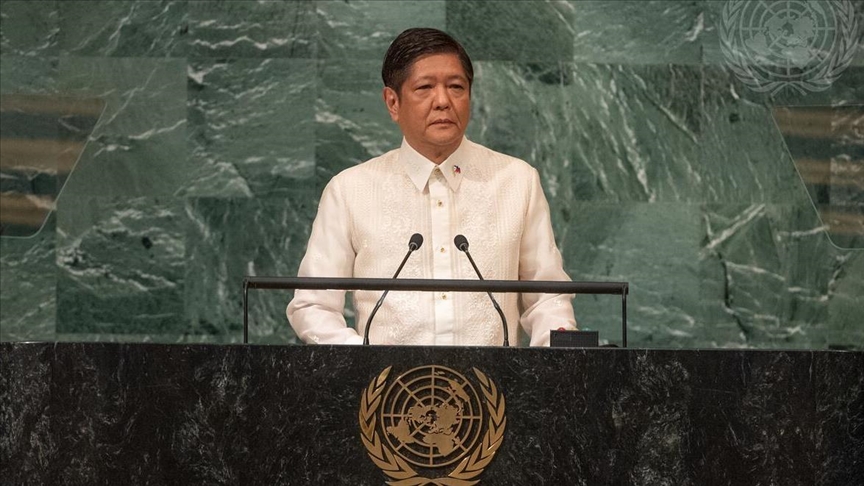Philippine president offers Bangsamoro formula for global peace in UN address
Ferdinand Marcos Jr. warns widening geopolitical polarities are ‘threat to hard-won peace in Asia-Pacific’
 Philippines President Ferdinand Marcos Jr. addressing 77th session of UN General Assembly. (Photo courtesy: United Nations)
Philippines President Ferdinand Marcos Jr. addressing 77th session of UN General Assembly. (Photo courtesy: United Nations)
ISTANBUL
Urging the UN to forge ahead with its tradition of global peacekeeping, Philippine President Ferdinand Marcos Jr. offered his nation’s experience in peacebuilding to the UN Security Council on Tuesday.
“My country’s experiences in building peace and forging new paths of cooperation can enrich the work of the Security Council,” said Marcos, addressing the 77th session of the UN General Assembly in New York.
“Our success in the Bangsamoro Autonomous Region of Muslim Mindanao in the southern Philippines is the centerpiece of these efforts,” he said, referring to the autonomous southern region in the archipelago nation.
Marcos said the fact that the Philippines has forged peace in the region “after many decades of conflict among warring factions and clansmen demonstrates that unity is possible even in the most trying circumstances.”
A decades-long insurgency by the Moro Islamic Liberation Front (MILF) led to peace talks with the Philippine government and the signing by President Rodrigo Duterte of the Bangsamoro Organic Law in 2018, which was ratified in early 2019 and resulted in the formation of the Bangsamoro Autonomous Region in Muslim Mindanao (BARMM).
Bangsamoro is a region south of the Philippines mainland and home to nearly five million people, mostly Muslims.
Under the BARMM, the Bangsamoro Transition Authority (BTA) was formed, which has its own 80-member parliament based in the capital, Cotabato.
The interim government of the BTA has been led by Chief Minister Murad Ebrahim since February 2019 whose term, along with that of parliament, was extended by three years up to 2025 by Marcos last month.
‘Hard-won peace in Asia under threat’
Urging support for the Philippines for its candidacy to the UN Security Council for the 2027-2028 term, Marcos said the Philippines “builds partnerships for peace and development through dialogue, including through inter-faith and inter-religious dialogue especially through” the Association of Southeast Asian Nations.
“Inclusive dialogue involving all stakeholders, including women, the youth, faith leaders and civil society, conducted with patience and good faith has produced a credible and solid foundation for self-government that paves the way for lasting peace and sustainable development,” he said, referring to Bangsamoro.
“We take the same approach in Asia…(and) the Philippines would be a friend to all and enemy to none.”
In the face of great diversity, said Marcos, the Philippines believes that “partnerships form the bridge to unite us in promoting peace and stability in the Asia-Pacific region.”
He warned, however, that “widening geopolitical polarities and sharpening strategic competitions are transforming the international political landscape.”
“A profound lack of trust is putting enormous strains on our multilateral system.
“Our very (UN) Charter is being violated around the world as we speak. In Asia, our hard-won peace and stability is under threat by increasing strategic and ideological tensions,” said the president, urging adherence to UN foundations
and to “reject any attempt to deny or redefine our common understanding of these principles.”








